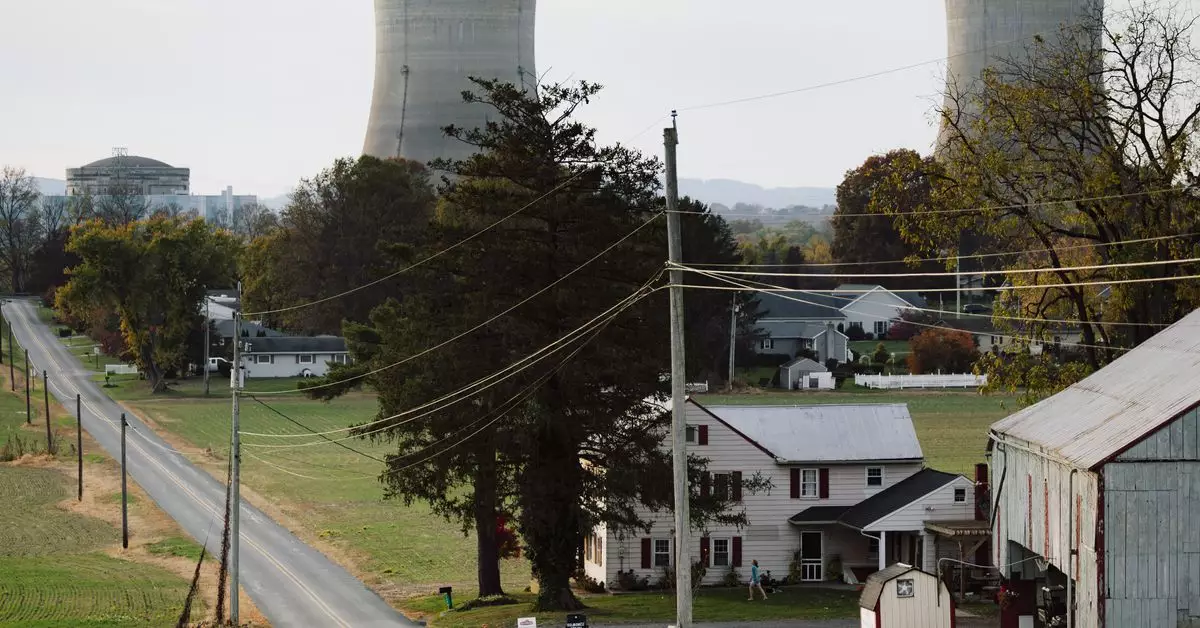In a significant development for the nuclear energy sector, the General Services Administration (GSA) has inked an unprecedented ten-year contract worth $840 million dedicated to the procurement of nuclear-generated electricity. This agreement signifies a pivotal shift in federal energy consumption, indicating the government’s resolve to integrate clean energy sources into its operations. With this contract, the GSA is set to acquire 10 million megawatt-hours of electricity, sufficient to power over one million homes annually. Awarding this contract to Constellation, which manages the largest nuclear fleet in the country, is further indicative of the growing reliance on nuclear energy within both government and corporate sectors amidst increased electricity demands.
The escalating energy requirements from sectors such as artificial intelligence and cloud computing are forcing organizations and governmental agencies to rethink their energy procurement strategies. Tech giants like Microsoft and Google have recognized the need for sustainable energy sources to power their expansive data centers, and they have made substantial investments to enhance nuclear energy’s role within their operational frameworks. The GSA’s contract reinforces that trend, marking a change in the landscape of energy procurement.
Constellation’s president and CEO, Joe Dominguez, pointed out that nuclear energy had often been overlooked in sustainability conversations within corporate and governmental frameworks. This contract not only showcases a significant partnership between the federal government and a leading energy provider but also reaffirms the commitment to invest in reliable energy sources that can support increased energy demands.
A Broader Commitment to Clean Energy
Constellation’s operational portfolio reveals a strong commitment to reducing carbon emissions, currently generating approximately 10 percent of the nation’s pollution-free energy via nuclear, as well as utilizing hydro, wind, and solar power. The company has set an ambitious target of achieving 100 percent carbon-free electricity by 2040, a goal that aligns with broader national interests in combating climate change. However, it remains unclear how much of the GSA’s energy needs will be met through non-nuclear sources, as both the GSA and Constellation have not provided detailed disclosures regarding this aspect of the contract.
Moreover, GSA Administrator Robin Carnahan emphasized the contract’s significance, highlighting its potential to stabilize energy costs amidst growing competition from data centers. This agreement not only seeks to secure reliable energy supplies but also to encourage investment in the nuclear sector, which has long been vital to the nation’s energy infrastructure.
Supporting Infrastructure and Future Developments
A crucial component of the GSA’s partnership with Constellation is the encouragement for infrastructure enhancements within the nuclear sector. By extending the licenses of existing plants and investing in new technology, the contract is set to add approximately 135 megawatts of capacity immediately, showcasing a dual approach of increasing output while enhancing the sustainability of existing energy infrastructure. The agreement to purchase 2.4 million megawatt-hours from this new capacity is a strategic move to secure energy supplies that will be increasingly vital as electricity demands rise.
Furthermore, the extension of this contract beyond GSA buildings to several federal departments—including Transportation, Veterans Affairs, and the National Park Service—illustrates a comprehensive approach to energy management within the government. This strategic framework provides various agencies with price stability and budget certainty, especially as they prepare for the ongoing fluctuations in electricity pricing.
In light of the Biden administration’s efforts to transition the country away from fossil fuels, nuclear energy appears poised for a renaissance. With notable investments to reinvigorate retired generating stations and competitive ventures by technology giants, the nuclear sector stands at a pivotal moment. Notably, events like the collaboration between Microsoft and Constellation to reactivate the infamous Three Mile Island reactor signal a significant shift in perception regarding nuclear energy; it is no longer regarded solely through the lens of past accidents but as a necessary component for future energy solutions.
The GSA’s landmark contract with Constellation reflects an evolving energy landscape, highlighting the necessity of nuclear energy in powering an increasingly electrified economy. As both the government and big tech mobilize in favor of sustainable solutions, the partnership underscores a new era in energy procurement where nuclear energy is not only acceptable but essential for achieving sustainability goals. As challenges like climate change intensify, the commitment to nuclear energy could very well transform the national approach to energy consumption and policy in the years to come.


Leave a Reply